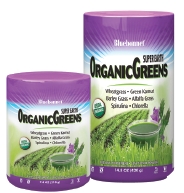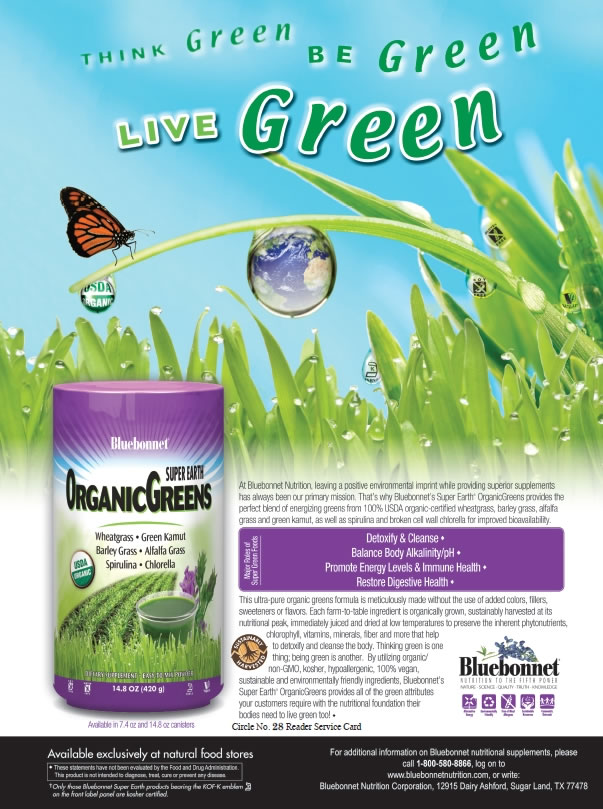Q: Mothers (and now science) have instilled the importance of eating green foods. Why?
A: Science has finally corroborated the importance of the message our mothers had instilled in us at an early age: EAT YOUR GREENS! Every day, researchers are finding new links between diet and disease. In fact, based on analysis from many prestigious research institutions, including the National Cancer Institute, Americans are urged to eat a varied, well-balanced diet rich in dark, leafy greens because they have been shown to be the first line of defense against environmental contaminants, such as smoke, pollution and harmful UV rays, that can often wreak havoc on our systems. Since the traditional Western diet is based on animal foods, such as meat and dairy products, and does not contain a lot of plant foods, like fruits, vegetables, seaweed and whole grains, it has been linked to many diseases, such as cardiovascular disease, cancer, stroke and diabetes. Phytonutrients, such as those inherent in green plants and sea vegetation as found in Bluebonnet’s Super Earth® OrganicGreens, can provide free-radical protection against these conditions and environmental contaminants.
Q: What green food sources provide the most health benefits and why?
A: Research indicates that the nutrients in green foods are vital for human health; but, since the human body cannot produce many of them, they must be consumed in the form of plants. For example, cereal grasses from land are the young, green plants that will grow to produce the cereal grain. The nutrient profiles of these grasses, such as wheatgrass, barley grass, green kamut and alfalfa grass as found in Bluebonnet’s Super Earth® OrganicGreens, are similar to those of the most nutritious dark green, leafy vegetables that grow on Earth. They contain a wide variety of essential vitamins and minerals in addition to chlorophyll, a crucial phytonutrient that is responsible for detoxification and maintaining the body’s alkalinity.
Additionally, cereal grasses have the advantage of offering high-quality, vegetable protein and fiber often missing in other whole food sources and from the traditional Western diet. Furthermore, sea vegetables like spirulina and chlorella are considered the ocean’s deep greens, rich in vegetable protein and full-spectrum concentrations of important carotenes, chlorophyll, enzymes, amino acids and fiber. Moreover, they’re an excellent source of bone-building minerals like calcium, iron, iodine and potassium, as well as trace minerals like boron, selenium and chromium that work to support the immune system and healthy glucose levels that are already within the normal range.
While the properties of different green foods may vary, one constant element in all green foods is chlorophyll, the essence that makes green foods—well, green—no matter if they are derived from the land or sea. Among other fascinating uses, chlorophyll has been shown to be beneficial in supporting respiratory and gastrointestinal health, as well as providing energizing and detoxifying properties.
 Q: Why is consuming green dietary supplements in powdered form more beneficial than just eating straight vegetables?
Q: Why is consuming green dietary supplements in powdered form more beneficial than just eating straight vegetables?
A: Consuming green foods in a powdered form can be more beneficial than eating vegetables straight off the vine for a variety of reasons: greater versatility, improved assimilation, an enhanced nutrient profile, convenience (i.e., no blender required) and better taste. Powdered green formulas like Bluebonnet’s Super Earth® OrganicGreens can be used in smoothies or any other medium the imagination can conjure up (e.g., salsa, sprinkled over your favorite cooked fish dishes [a dash will do ya!]), making the product useable with a variety of food options.
Also, with a powdered formula, the amount of time it takes the nutrients to travel from the stomach to the small intestine for absorption is miniscule.
Additionally, vegetables can sometimes be overcooked, which causes them to lose their essential nutrients. On the other hand, using a farm-to-table greens powder like Bluebonnet’s Super Earth® OrganicGreens that has not been processed, you get the benefits of all the phytonutrients that naturally exist in nature by simply adding a spoonful of greens powder to a cup of cold water and shaking. It’s a convenient way to get all the greens you need, especially for those constantly on the go. Furthermore, the neutral taste profile of a powdered greens formula can be beneficial for those individuals who do not like the taste of veggies. Plus, according to Charles F. Schnabel, a renowned 1940s wheatgrass expert, “15 pounds of wheatgrass is equal in overall nutritional value to 350 pounds of ordinary garden vegetables!” So pound for pound, powdered greens formulas can pack a heavy nutritional punch.
Q: What “green” attributes (e.g., organic/non-GMO, kosher, sustainable, etc.) should I look for in a greens product?
A: Look for a farm-to-table greens product like Bluebonnet’s Super Earth® OrganicGreens packed with significant amounts of six nutrient-dense green foods, such as wheat grass, barley grass, alfalfa grass and green kamut, plus chlorella and spirulina—that are 100% USDA-certified organic/non-GMO and kosher-certified—instead of offering meaningless quantities of everything but the kitchen sink. Since so many people are sensitive to allergens, the greens product should also be gluten- and soy-free like Bluebonnet’s Super Earth® OrganicGreens. Additionally, the ingredients in these green formulas should also be grown organically, sustainably harvested at their nutritional peak and immediately juiced or dried at low temperatures. This farm-to-table process is important because it preserves the inherent  chlorophyll and trace minerals responsible for the detoxifying and cleansing properties of these super foods. And as a result, their nutritional integrity is maintained, providing a greens product like Blubonnet’s Super Earth® OrganicGreens that is as close to nature as possible. WF
chlorophyll and trace minerals responsible for the detoxifying and cleansing properties of these super foods. And as a result, their nutritional integrity is maintained, providing a greens product like Blubonnet’s Super Earth® OrganicGreens that is as close to nature as possible. WF
Trisha Sugarek MacDonald holds a Master of Science in Nutrition from Texas Woman’s University and also a Bachelor of Science Degree in Nutrition and Foods from Texas State University. Mrs. MacDonald is currently the Director of Research & Development as well as the National Educator at Bluebonnet Nutrition where she investigates new ingredients, directs the launch of new products, and provides industry training on numerous subjects as it relates to the connection between nutrition and health. She is a frequent editorial contributor and lecturer on the benefits surrounding the responsible use of supplements.

Published in WholeFoods Magazine, February 2014









